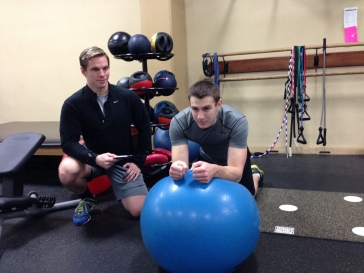In a recent article, Eric Cressey, fitness enthusiast and owner of Cressey Performance, advocates that students take a thoughtful and planned approach when considering whether to enter the field of Personal Training. The Personal Training program at Glendale Community College follows Cressey’s advice, preparing students to make that well-informed decision.
Here are Cressey’s top five recommendations:
1. Go observe a few current fitness professionals who are successful in their crafts. Ask questions and get a feel for whether this is a good fit for you before you jump into the deep-end, quitting your job and investing all sorts of cash in a career change.
EXS101, the first course in the GCC Personal Training Program, gives students an opportunity to explore career options in the field and meet people working in the industry. During an internship requirement students 80-240 hours working alongside the experts.
2. Wait a year to get a certification. What? Huh? This is supposed to come first, right? Wrong. Getting a certification without any background experience makes you a liability, not a professional. Every penny you spend in that first year should be on books, DVDs, seminars, and travel to go observe other coaches/trainers in action. And, you should be taking advantage of all the free resources there are for you to get educated online. Don’t ignore fitness industry business resources, either; they aren’t taught with certifications or degrees, but are tremendously important.
Prior to obtaining certification, GCC students can complete one of three certificate programs or earn an associate’s degree. These programs give you a solid exercise science background and hands-on experience working with clients before you take the national certification exam. After completing these programs you’ll be more employable, and a better resource for your clients.
3. Get an internship. This is an extension of #1 – and it still comes before getting a certification. You need to log at least three months of 40-hour weeks somewhere learning your craft and paying your dues. Get a feel for whether you could see yourself doing this long-term.
Obviously, this is a concern because it would require you to quit your job, so you’d need to save up for this period. However, you would be amazed at how many interns are hired by facilities after their internship period is over (all our “hires” at Cressey Performance have been former interns). And, most facilities will pay for your certification and CPR/AED training, and some will even give you a continuing education stipends on top of it.
We agree. That’s why the internship is an integral part of the educational plan at GCC. The Personal Trainer Certificate internship requires 80 contact hours, and it does not have to be done in a 40-hour week. The Associate’s Degree internship is 240 contact hours, but can be divided up between semesters if necessary.
4. Get a certification. Yes, it is step 4. Frankly, I don’t really care what certification you get because none of them really wow me, but then again, I have a hard time justifying an undergraduate exercise science degree for $100, let alone $200,000. If I was 18 today, I’d save all that money, get an internship, and spend the cash on loads of books/DVDs – and taking selective courses (gross anatomy, kinesiology and biomechanics). Most jobs will require it even if it is just a small foot in the door.
The certificate or an associate’s degree from Glendale Community College will prepare you to be a successful trainer. You’ll need an NCCA-accredited personal trainer certification to get any job in the field. If you want to increase your earning potential, consider higher education – a bachelor’s, master’s, or a PhD. Whatever your goal, GCC is the perfect launch pad for the rest of your educational plans.
5. Pay your dues. There is no way around it. You aren’t magically going to have a full client roster on your first day of a job; you have to start somewhere. I can promise you that you will be better off with the background you’ve created with steps 1-4.
In Outliers, Malcolm Gladwell talks about the importance of accumulating 10,000 hours in order to become an expert in one’s field. There are only 8,760 hours in a year – and even if you assume 60-hour work-weeks, it’s still going to take over three years to get to that 10,000-hour mark.
Be the best intern you can be – and absorb all the learning possible. Work at a fitness center front desk so you become familiar with the needs of customers and clients. Volunteer in your community. Give presentations. Go to high schools. Go to church groups. Go to health fairs. Practice, practice, practice. Your years of experience will become another major selling point when you apply for that dream job!
I’d like to hear your questions or stories about your personal training educational experience. Reach me at:
Louise So
Personal Trainer Program Director
louise.so@gccaz.edu
623-845-3883
